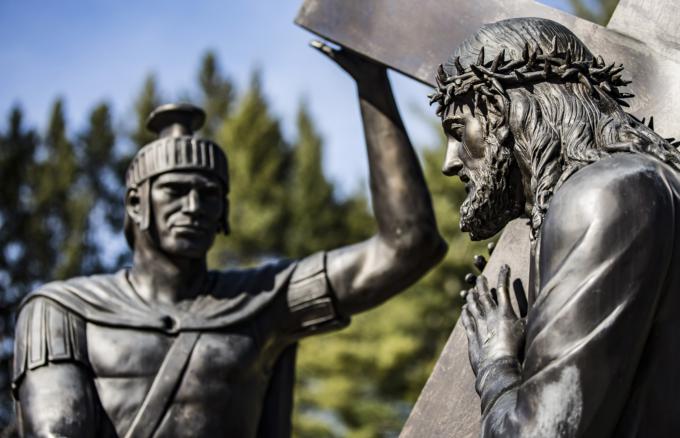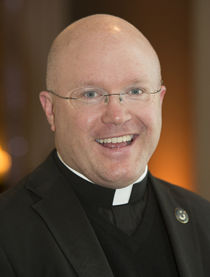
Faith
As we prepare for Divine Mercy Sunday in the midst of the Covid-19 pandemic, I think that Psalm 136's vivid, living memory of God's abiding mercy can help us all.

Landry
One of the most powerful Psalms to pray when we might be feeling abandoned by God is the "Great Hallel," so called because it is an extraordinary hymn of praise for all God has done repeatedly to care for and rescue his people in need.
Psalm 136 is a 26-verse litany most remembered for the refrain after each verse, "for his mercy endures forever." It praises God for his steadfast love shown in creation, in rescuing the Israelites from slavery in Egypt, leading them through the Red Sea and the desert, defeating the powerful kings who opposed them, giving them the land as their inheritance, remembering them whenever they were in their misery, and never ceasing to feed them.
It is normally sung by Jews at the end of the Passover Seder, at the morning service of the Sabbath, and frequently on festivals. It summarizes the Old Testament history of salvation, praising God for his faithfulness and goodness in regularly intervening to save his people.
Jesus and the apostles very likely sang it at the end of the Last Supper before they went out to the Garden of Gethsemane (Mt 26:30; Mk 14:26). The references to God's merciful love during the Passover and exodus put into relief how the God-man was then bringing to fulfillment what all of his previous interventions foreshadowed: the definitive redemption of God's people from sin and death in the new and eternal Passover.
During my years in seminary, as I began to pray Psalm 136 regularly at Vespers, I was moved to write new "verses." I began with some of the great events in the life of Jesus -- his incarnation, birth, preaching, miracles, passion, resurrection, appearances, and great commission. Then, beginning with Pentecost, I continued with various verses from the life of the early Church going on to some of the great interventions of God in Church history. I finished by praising God for his interventions in my life: his mercy for giving me the parents he did, the gift of the sacraments of baptism, confirmation, confessions and the Holy Eucharist, my priestly calling, and so many answered prayers.
The more I prayed it, the more I became convinced that the God who had proven himself so faithful in pouring out his mercy throughout salvation history and my history would always be there for me. Even if I were going through a time of darkness or suffering, I knew that I could count on God's merciful love, even if I should have to wait for it, even if it might come in a way that I might not foresee or initially appreciate.
Because Psalm 136 is prayer of grateful memory for God's enduring mercy, I have also encouraged others, in confession, spiritual direction and other settings, to pray Psalm 136 and to try to write their own extended verses for the ways that the Lord has shown his mercy precisely to them. Listing them in a Litany, and prayerfully remembering them in God's presence intercalated with the refrain "for his mercy endures forever," is a potent remedy for discouragement, especially in times of desolation.
As we prepare for Divine Mercy Sunday in the midst of the Covid-19 pandemic, I think that Psalm 136's vivid, living memory of God's abiding mercy can help us all.
We must insistently turn to the Lord who mercifully protected the Israelites from the plagues in Egypt, who heard King David's prayer for mercy when pestilence was attacking Israel and Judah (2 Sam 24:10-25), and who inspired the Psalmist to have us invoke him as "my refuge and fortress, my God in whom I trust [who] will rescue you ... from the destroying plague" so that we "shall not fear ... the pestilence that roams in darkness nor the plague that ravages at noon" (Ps 91).
God wants us to turn to him with trust in his mercy. The Vatican's Congregation for Divine Worship on March 30 encouraged the whole Church to do so through a new "Mass in the Time of Pandemic," which I anticipate priests will start using regularly as soon as the Easter Octave is completed. The opening prayer of the new Mass can likewise be used by the faithful in their personal prayer to beseech an end to the pandemic as well as to ask for mercy on all those most afflicted:
"Almighty and eternal God, our refuge in every danger, to whom we turn in our distress; in faith we pray, look with compassion on the afflicted, grant eternal rest to the dead, comfort to mourners, healing to the sick, peace to the dying, strength to healthcare workers, wisdom to our leaders, and the courage to reach out to all in love, so that together we may give glory to your holy name."
As we draw near to Divine Mercy Sunday, however, I would particularly encourage people to pray with fervor the devotion that, according to St. Faustina Kowalska, Jesus himself revealed to her in the 1930s as she was battling the lung-destroying disease of tuberculosis.
This devotion, approved by the Church, features five elements: stopping each day at 3 pm, when Christ breathed his last on Calvary, to implore his mercy and bring him our prayers; venerating him in the image of Divine Mercy, by which he, risen from the dead, blesses us and asks us to trust in him; praying the Chaplet of Divine Mercy, offering God the Father Jesus in the Eucharist and begging him, on account of his Son's passion, for mercy on the whole world; praying a novena, starting from Good Friday, in which we bring to Jesus various groups of people in need of his mercy; and finally Divine Mercy Sunday, when we celebrate the end of the Easter Octave and ponder in the Gospel Jesus' establishment of the Sacrament of his Mercy on Easter evening.
It's a devotion that can be applied powerfully to different aspects of the coronavirus.
First, with regard to the praying for the end of the pandemic, Jesus made an extraordinary promise about the hour of mercy. "In that hour," he said, "I will deny nothing to the soul that asks me in the name of my Passion."Just like New Yorkers stop at 7 pm now to cheer on health care works, Catholics should stop at 3 pm to turn to Jesus and, on account of the merits of his suffering, death and resurrection, entreat him to free the world of this pandemic and to help those who have contracted the virus.
Second, concerning those who are dying, Jesus similarly made an extraordinary promise about the chaplet. Jesus asked priests to "recommend it to sinners as their last hope of salvation. Even if there were a sinner most hardened, if he were to recite this chaplet only once," with an attitude of trust, humility and sorrow for sin, "he would receive grace from my infinite mercy." Many priests have seen conversions at deathbeds during or after praying the chaplet. I've heard several similar stories during the pandemic.
Third, regarding health care workers, who are courageously and generously caring for those who are sick, we can regularly be asking Jesus in the Divine Mercy image to pour out his mercy upon them and through them -- and to help them entrust themselves, and their patients, to his merciful care.
For all three of these intentions, it would be good to make together a perpetual novena of Divine Mercy, similar to the one Jesus asked for, praying that all concerned "draw from [the fount of his mercy] strength and refreshment and whatever graces they need in the hardships of life and, especially, at the hour of death."
Normally on Divine Mercy Sunday we celebrate God's mercy understood principally as forgiveness of sin, but we know that Jesus' mercy was similarly extended in healing the sick, which was a quasi-sacramental corporeal sign of what Jesus wishes to do for our souls.
This Divine Mercy Sunday is an opportunity to implore, both as we give God thanks for his mercy that endures forever and avail ourselves more fully of the means he has given us to implore it.
- Father Roger J. Landry is a priest of the Diocese of Fall River, Massachusetts, who works for the Holy See's Permanent Observer Mission to the United Nations.
Recent articles in the Faith & Family section
-
The Christmas crecheFather Robert M. O'Grady
-
Feeling like ChristmasJaymie Stuart Wolfe
-
Parish priests and their peopleMsgr. Frank Kelley
-
Be the carolArchbishop Richard G. Henning
-
Give a Christmas Gift to the MissionsMaureen Crowley Heil


















